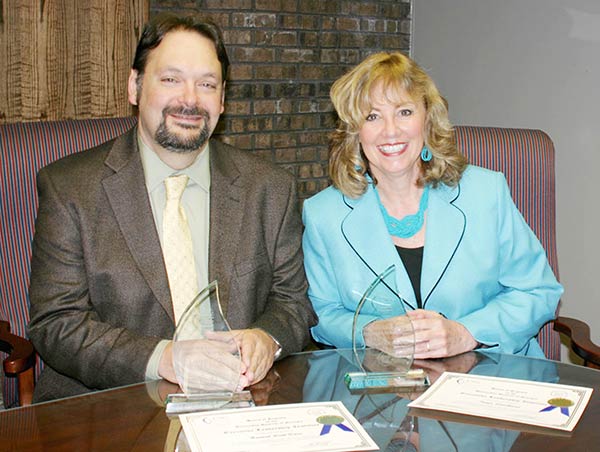BC administrators receive awards
Published 3:39 pm Tuesday, September 20, 2011

BAINBRIDGE COLLEGE’S FIRST TWO ADMINISTRATORS to complete the University System of Georgia’s Executive Leadership Institute (ELI) are seen here with their ELI awards and certificates. They are (from left) Chief Information Officer Scott Dunn of the Office of Information and Instructional Technology and Vice President for Academic Affairs Dr. Tonya Strickland. They were recognized for achieving excellence in their continuing professional development as leaders at the college and in the system.
By MARCIA McRAE
BC Communications Director
Two Bainbridge College administrators have been honored by the University System of Georgia (USG) and by Bainbridge College President Richard Carvajal for achieving excellence in their continuing professional development as leaders at the college and in the system.
Vice President for Academic Affairs Tonya Strickland, and Chief Information Officer (CIO) Scott Dunn of BC’s Office of Information and Instructional Technology (OIIT) completed USG’s Executive Leadership Institute (ELI) and are poised to serve as mentors for new ELI scholars. They hold the distinction of being Bainbridge College’s first ELI Scholars.
Strickland and Dunn received certificates and engraved trophies for completing the 100-hour ELI leadership development program, which included 40 hours of job shadowing. Strickland shadowed South Georgia College President Virginia Carson, and Dunn shadowed Dr. Paul Jones, who is vice president for administration and operations at Georgia College and State University.
From Carvajal, they received copies of the book Now, Discover Your Strengths, by Marcus Buckingham and Donald O. Clifton, Ph.D.
“I am extremely proud of the achievements and leadership of our first two ELI Scholars from Bainbridge College,” President Carvajal said. “Vice President Tonya Strickland and CIO Scott Dunn are part of our wonderful and effective team of key leaders, who make a positive difference at Bainbridge College. Tonya and Scott have shown what we can do to develop our local leadership so that we can enhance our work together to make a difference in the lives of our students, the communities we serve, and beyond.
“They are instrumental in advancing BC’s Strategic Plan, which includes providing students a comprehensive, high quality experience; building a stronger campus community by enhancing organizational effectiveness; expanding the education, economic, social and cultural opportunities for the citizens of our service area, and promoting faculty and staff development to advance excellence in education.”
The USG Board of Regents and its new Chancellor Hank Huckaby encourage and support leadership development throughout the system. They recognize that identifying, developing, and supporting high-potential employees within the system is a key to attracting and retaining the best talent the state, the nation, and the world have to offer.
Implemented in 2009 to strengthen USG’s future leadership in order to be consistent with the Regents’ Strategic Goal Six, “Increasing Efficiency Working as a System,” ELI is designed to help its scholars acquire two key components of leadership: self-awareness, especially regarding one’s role within an organization, and awareness of the impact one has on others, be it positive or negative.
ELI’s creation developed from initial work in 2006-07 by Dr. Wayne Clough’s task force on training and professional development. “Our challenge is to develop leaders in a systematic manner,” said then-Chancellor Errol B. Davis Jr.
At the orientation for Strickland and Dunn’s ELI Scholars cohort of 67 faculty and staff leaders, Davis said, “If we are going to be successful in meeting the mission of the System and the state’s needs, we must have the right leaders in place … at every level of the organization.” He said leaders, “must be nurtured, trained, and grown.”
USG Assistant Vice Chancellor for Professional Development Tina Woodard praised Strickland, Dunn, and their fellow scholars for their achievements within their respective institutions that contributed to their nomination and selection as ELI Scholars.
Learning activities for the scholars included 360 assessments, peer mentoring, an inclusiveness session, interactive president panel discussions, and the 40-hours of one-to-one job shadowing.
“The opportunity for our scholars to hear institution presidents describe their own personal and professional leadership challenges during their careers is not only intriguing but highly educational and promotes the development of a leadership culture in the University System,” Woodard said.
Among the presidents on the panel was Dr. Carson, whom Vice President Strickland shadowed.

